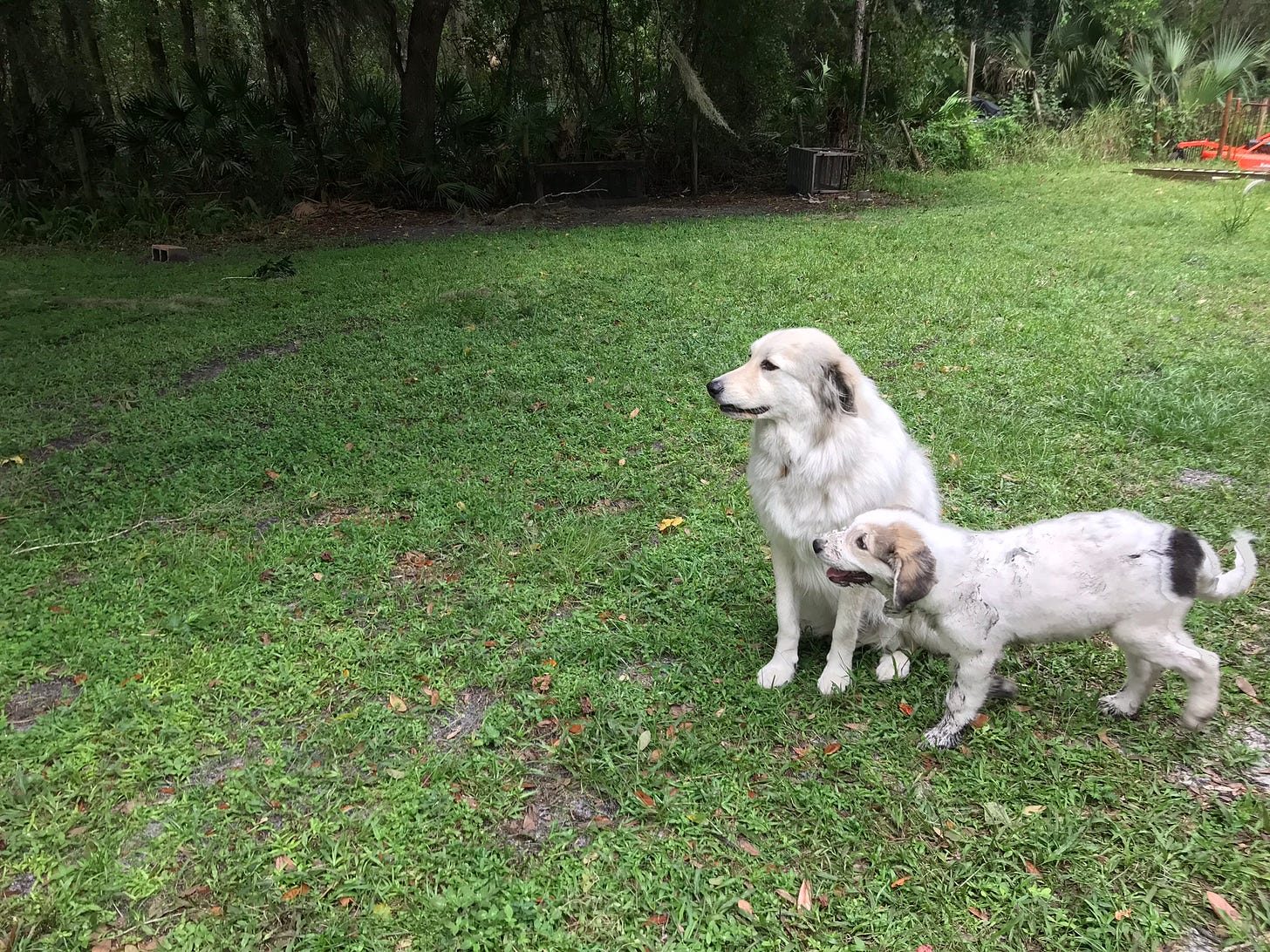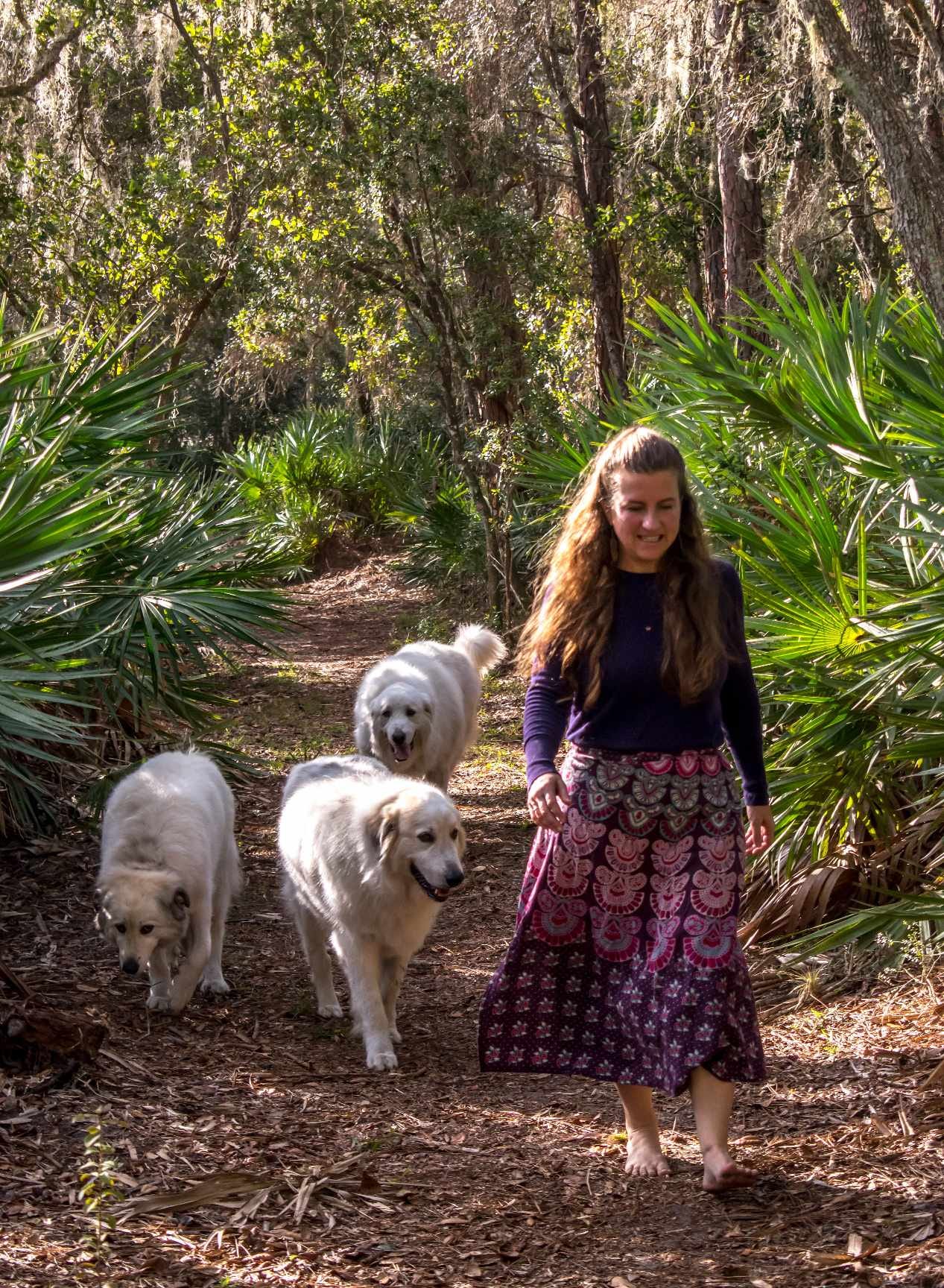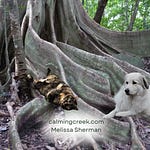If you’ve ever visited my home, one of the first things you’ll notice is the barking.
Not a bark here and there—real barking. Deep, purposeful, rumbling barks that echo across our 16-acre property.
It’s not random. It’s not bad behavior. It’s my Livestock Guardian Dogs—Baldr, Arya, and Loki—doing their job.
And they’re really good at it.
These three are actual working dogs. Their role is to protect our chickens, goats, pigs, and other animals from ground and aerial predators. Think coyotes, foxes, even eagles. Yes—eagles. The video I share is of Baldr, warning a bald eagle flying overhead to keep moving. It’s his way of saying: “Not today. Not my chickens.”
LGDs like mine aren’t guard dogs in the way people think. They don’t attack. They don't stalk. They don’t have a prey drive. They protect through presence—big bark, big body, big boundary.
And yet, I get asked all the time:
“Why do you let them bark like that?”
“Do they do this all the time?”
“How do I get mine to stop?”
The truth?
They do bark a lot. Especially at night. And I let them. Because they’re doing what they’re born to do.
Misunderstood Intelligence
LGDs often get mislabeled as “low energy” because they don’t zoom around like Border Collies and Shepherds. But barking is energy. Watching, thinking, problem-solving? Energy.
Arya was the first dog I ever had who made good decisions completely on her own—without me giving a cue. I’ll never forget the moment I realized she was truly choosing how to respond to a threat. And I thought, “Oh. You know more than I do in this moment.”
That was the beginning of me letting go of the need to control.
And let me tell you: it’s beautiful on the other side.
But What If It’s Not a Bald Eagle?
Let’s say you don’t live on a farm. Let’s say your LGD just ate your couch. Or barked all day at the window. Or dug through drywall to get to a noise you couldn’t even hear.
That’s when behavior becomes a puzzle.
Before we try to correct a behavior, we have to ask: what is the dog trying to do?
What unmet need are they trying to express?
That’s where energy work and tools like the pendulum come in.
Barking, Balance & the Pendulum
I teach a class on using the pendulum in everyday pet care—and this is one of the biggest reasons why.
With the pendulum, I can often uncover:
Emotional imbalances that cause restlessness or over-vocalizing
Dietary or environmental triggers for behaviors
Energetic patterns that reflect stress, fear, confusion—or deep purpose
Sometimes, it’s not about “stopping” the barking. It’s about understanding it, honoring it, and redirecting it if needed in a way that respects the animal.
One of my clients had a pup that barked incessantly every afternoon. Through muscle testing and pendulum work, we realized it was tied to anxiety around a particular delivery truck sound. The solution wasn’t punishment—it was calming herbs, flower essences, a shift in routine, and an energy healing session that cleared a long-held trauma.
Let Dogs Be Dogs
When Baldr barked at that eagle, my heart swelled with pride.
This is what he’s meant to do.
This is what we are meant to do: listen to our animals, ask the deeper questions, and support them holistically.
If you’ve got a “barker,” a puzzler, or a pup with big feelings—join me in my upcoming Pendulum for Pet Parents class. I’ll teach you how to use this simple tool to tune in to your animal’s energy and needs, and start getting some answers of your own.
Until then—let them bark.
Let them be dogs.
And maybe, let yourself be a little more free range too.
Disclaimer: The information shared in this blog is for educational and informational purposes only. I am not a veterinarian, and my services are intended as a complementary practice to support your pet’s overall well-being. They are not a substitute for professional veterinary care, diagnosis, or treatment. Always consult your veterinarian regarding any medical concerns, conditions, or treatments your pet may require.
I’m Melissa, an animal communicator and energy healer with a diverse background in holistic animal health. I’m passionate about helping animals live their best lives naturally, and I share insights from my own experiences with my seven dogs and four cats on our farm sanctuary.
Thanks so much for reading! I hope the tips in this article were helpful for you and your animals. If you'd like to learn more or connect, feel free to visit me at calmingcreek.com.
I’d love to hear your thoughts, so don’t hesitate to leave a comment or reach out!










Share this post